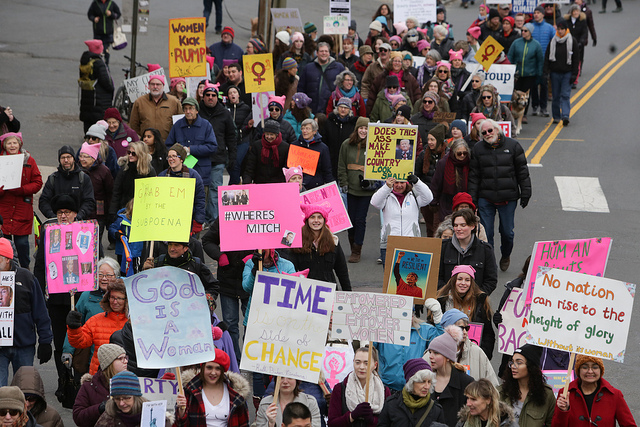Thousands of women, men and children of all ages marched from Sheldon Field to Northampton City Hall for the third annual Pioneer Valley Women’s March this past Saturday.
Starting at 11 a.m., participants gathered at Sheldon Field, the majority holding a variety of picket signs and wearing pink hats, the unofficial symbol of the Women’s March.
“I am here in solidarity about uncomfortable conversations about privilege and marginalization and violence and survival,” Rachel Gordon, a resident of Greenfield, said through a megaphone.
Gordon, a self-identified white, Jewish, able-bodied and heterosexual woman, spoke about the complex relationships that exist between women in the fight toward gender equality, namely the long history of Black, queer and trans women being erased from feminist movements. She specifically cited how some transgender people felt excluded by the pink “pussy hats” because they symbolized cisgender narratives.
Gordon also spoke about rumors of anti-Semitism that have surfaced among the leaders of the Women’s March. She said that in her personal experience, she has only been “loved and supported” by prominent Women’s March leaders such as Tamika Mallory and Linda Sarsour.
“When we walk away, when we cancel each other, the people who really hold power, which is definitely not Black women in America and it is not Jewish people and it is not Muslim people in America, those people get exactly what they want,” Gordon said.
Another invited speaker to the Sheldon Field gathering were Stacey Sexton, a member of the International Socialist Organization who read a statement formed by several organizations calling for feminism that can fight for the equality and equity for marginalized groups in the United States.
At 12 p.m. the crowd of people walked down Route 9, chanting phrases such as “women united will never be defeated.” As the crowd marched down the streets, more and more supporters joined in, bringing the march to roughly 1,000 participants.
The march ended at Northampton City Hall, where participants were greeted by the excited drumming of the Valley Women’s Drummers, who played on the steps of the building.
Following their performance were three keynote speakers. Tanisha Arena, the executive director of Arise for Social Justice, delivered a speech about the importance of understanding queer Black women’s plight and role in the fight for equality.
“Speak up, because your silence is deafening. ‘Ain’t I a woman?’” she said. “White women step back in these movement[s], black trans women have built tables and chairs, set the table and even cooked the meal only to be deliberately and violently removed from these tables. In our march today, let the call be about giving those seats and following the lead of Black trans women instead of just making space.”
The crowd immediately burst into cheers. Arena then went on to discuss the disproportionate levels of violence that Black along with Hispanic and Latina trans women face in the United States compared to white American women.
“Black women, sisters, the same way we have been brushed to the back, dismissed and overlooked, we must not pass on that behavior. My message to you all is [for] white allies [to] show up for Black women. It is well past time be intentional about Black and brown women in these movements,” Arena said.
Following Arena was Kamini Waldman, a co-chair of the Northampton High School Democrats, who spoke about her experience in organizing after learning about the 2012 Sandy Hook shooting and how she has been inspired by young activists such as Emma González and Malala Yousafzai.
“At the beginning of the school year I took my first steps as an activist alongside so many others. I worked to oppose the Brett Kavanaugh appointment, I phone-banked, I helped organize a walkout at Northampton High School and I wrote a letter to the editor at the [Daily Hampshire] Gazette, but we all know how that turned out,” Waldman said.
Waldman then described the feeling of being upset after Kavanaugh was still appointed to the Supreme Court, but she vowed to not let that defeat stop her.
Finally, Mehlaqa Samdani, executive director of Critical Connections, a nonprofit which “seeks to improve understanding of social, political and religious trends related to Muslim communities” according to its website, spoke about why Americans must continue to march.
“We march to remind ourselves that a pillar of this community, Eduardo Samaniego, is currently languishing in a detention facility in Georgia, where his deportation is being fast-tracked because of his activism,” Samdani said.
Samaniego was a prominent immigration rights activist who was jailed in October of 2018 and eventually deported to his home country of Georgia. He spent a great deal of time at the Pioneer Valley Workers Center in Northampton.
Samdani also cited other political events that needed support from the Women’s March, such as transgender unemployment caused by discrimination, sexual assault among young women, and the Trump administration’s policies on undocumented children.
Following the speeches was a celebratory recognition of the newly elected women in Congress such as Democratic Rep. Alexandria Ocasio-Cortez from New York, Democratic Rep. Ayanna Pressley from Massachusetts and Democratic Rep. Rashida Tlaib from Michigan.
Alvin Buyinza can be reached at [email protected] and followed on Twitter @abuyinza_news.




















